Accidents at Work in Romania: Insights from Bucharest Lawyers
Accidents at Work in Romania: Insights from Bucharest Lawyers
Did you know Romania sees over 4,000 workplace accidents every year?
The construction and industrial sectors have the most incidents.
Knowing your rights and the legal protections is key to staying safe at work.
It’s important to understand the occupational hazards in Romania.
This knowledge helps protect you and your career.
Whether you work in construction, energy, or IT, knowing your rights is vital for safety and compensation.
Workplace safety in Romania is governed by strict laws.
These laws aim to prevent industrial accidents and protect workers.
The Romanian Labor Code outlines the rules employers must follow to keep workers safe.
Key Takeaways:
- Romania has specific legal protections for workplace safety;
- Construction and industrial sectors face higher accident risks;
- Employers must establish health and safety committees;
- Comprehensive documentation of workplace incidents is mandatory;
- Employees have specific rights in case of workplace accidents.
If you need expert legal advice on workplace accidents in Romania, contact an Employment Lawyer in Bucharest.
Our team offer professional support and advice.
Understanding Workplace Safety in Romania: Legal Framework
Working in Romania means knowing the laws that keep everyone safe.
The laws are strong, making sure everyone follows the rules.
This is true for all kinds of jobs.
Key Labor Law Regulations
The laws in Romania are clear about keeping workers safe.
The main laws are:
- Law No. 53/2003 (Labor Code)
- Law 319/2006 on safety and health at work
- OUG 137/2000 on prevention and discrimination
- Law No. 202/2002 on equal opportunities
Employer Obligations Under Romanian Law
Employers in Romania must do a lot to keep the workplace safe.
They must:
- Do detailed workplace inspections Romania to find dangers;
- Give all workers the safety training they need;
- Give out free personal protective equipment (PPE);
- Tell the labor inspectorates about serious accidents within 24 hours.
Employee Rights and Protections
Romanian law gives workers big rights.
They have the right to:
- Say no to unsafe work without getting in trouble;
- Get the safety training they need;
- Get compensation for work injuries;
- Be safe from workplace discrimination.
Knowing these laws helps make a safer work place.
It makes sure everyone is treated fairly and safely.
Common Types of Workplace Accidents in Romania
Exploring workplace injuries in Romania is key for keeping employees safe.
Knowing the most common accidents helps prevent them in different industries.
Romania’s workplace accident statistics show clear patterns in various sectors.
These patterns highlight the daily risks workers face.
This makes it vital for employers to assess risks in Romania.
- Manufacturing sector experiences high accident rates;
- Construction industry shows significant workplace injury risks;
- Transportation and storage sectors report frequent incidents.
Romania’s safety laws require detailed accident reports.
By analyzing these, employers can create better prevention plans.
| Sector | Most Common Accident Types | Injury Percentage |
|---|---|---|
| Manufacturing | Machine-related accidents | 29.4% |
| Construction | Falls and tool-related injuries | 19.5% |
| Transportation | Movement-related incidents | 12.1% |
Workers’ compensation in Romania is vital for understanding these injury trends.
Losing control of machines is the top cause of accidents, making up 20.3% of non-fatal incidents.
By grasping these patterns, you can improve workplace safety.
This helps reduce risks in Romanian industries.
Legal Requirements for Workplace Safety Measures
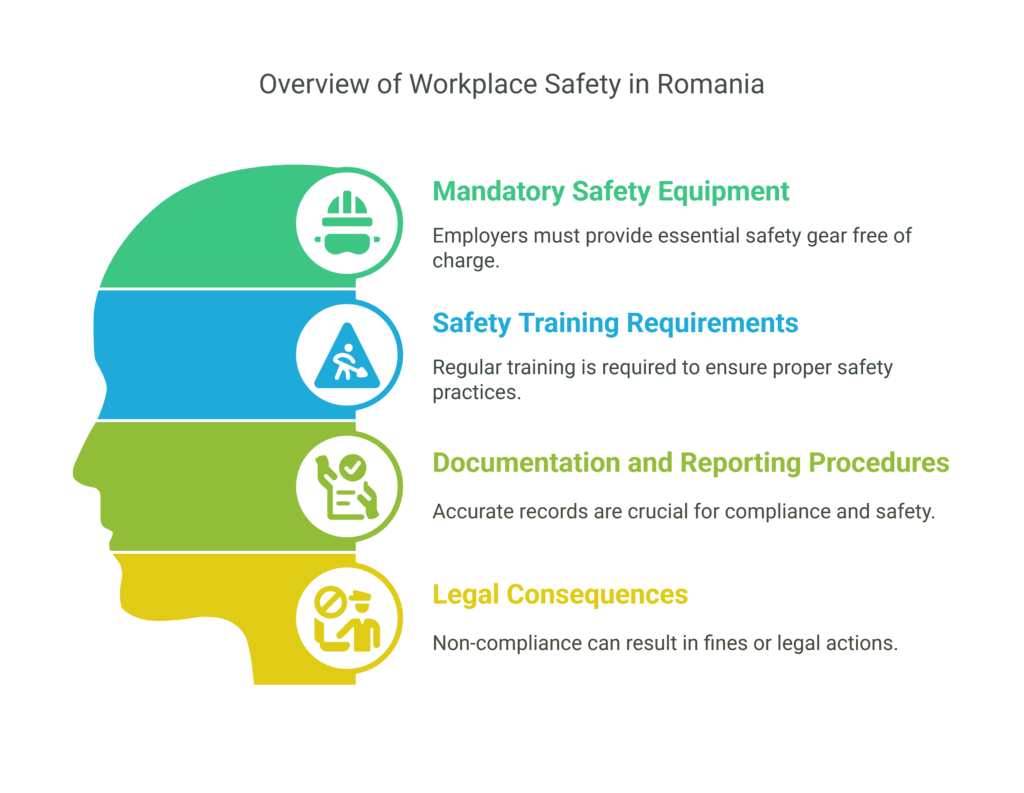
In Romania, protecting workers is a top priority.
The laws are strong, making sure everyone is safe at work.
Law No. 319/2006 sets clear rules for keeping workers safe and what employers must do.
Romanian labor laws require specific safety steps.
These rules help keep workers safe from harm.
They aim to reduce risks and protect employees.
Mandatory Safety Equipment
Employers must give workers the safety gear they need for free.
This includes:
- Personal Protective Equipment (PPE);
- Protective clothing for job risks;
- Safety helmets for construction;
- Special gear for dangerous places.
Safety Training Requirements
Good safety training is key for workers’ rights.
Employers need to offer regular training. It should cover:
- Finding and dealing with hazards;
- Using safety gear right;
- What to do in emergencies;
- How to lower risks.
Documentation and Reporting Procedures
Keeping accurate records is vital for safety.
Employers must keep up with:
- Workplace risk checks;
- Training logs;
- Accident reports;
- Records of safety equipment checks.
The Labor Inspectorate checks these rules.
Breaking them can lead to fines up to 10,000 RON.
Serious cases might even mean stopping work or facing criminal charges.
This shows how important safety at work is.
Worker Compensation and Benefits in Romania
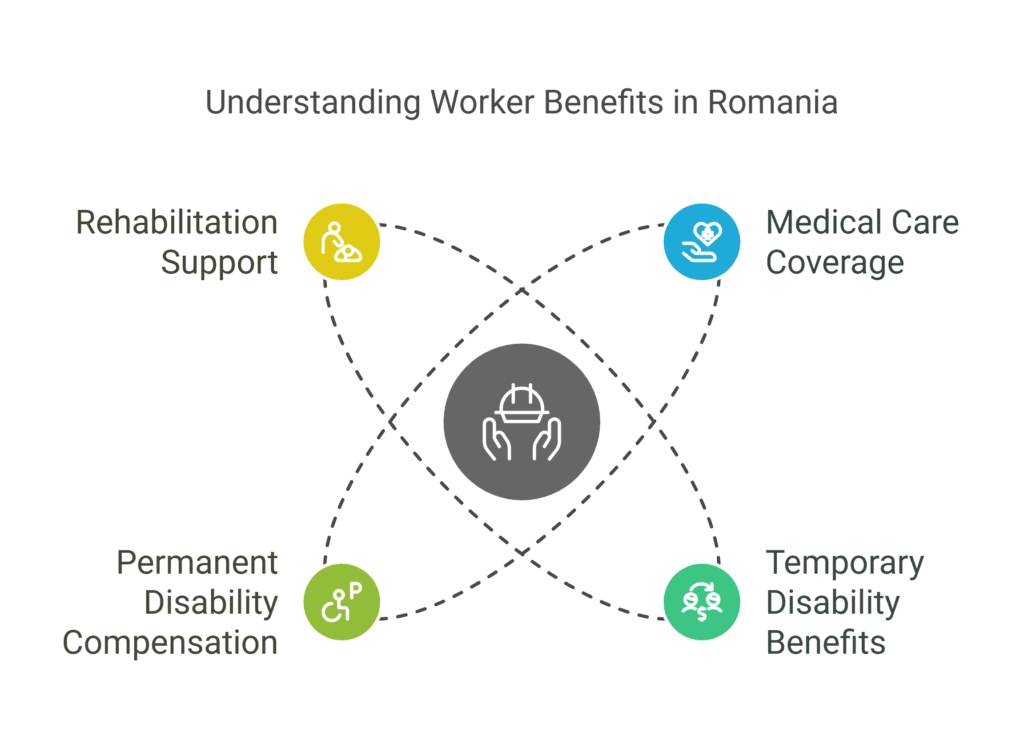
It’s important to know about worker compensation laws in Romania.
These laws protect your rights at work.
They ensure you get the help you need after an accident.
Here are some key benefits you get:
- Medical care coverage for work-related injuries;
- Temporary disability benefits;
- Permanent disability compensation;
- Rehabilitation support.
The laws in Romania have clear rules for compensation.
If you get hurt at work, you get money based on how bad the injury is.
| Benefit Type | Coverage Percentage | Duration |
|---|---|---|
| Temporary Disability | 75-100% of average salary | Up to 180 days |
| Permanent Disability | Varies by disability grade | Long-term support |
| Medical Expenses | Full coverage | As needed |
To get these benefits, you need to follow certain steps.
It’s important to report accidents quickly to get your rights.
Assessments help figure out how much you should get.
Money for these benefits comes from both employers and employees.
Accidents at Work in Romania: Statistics and Trends
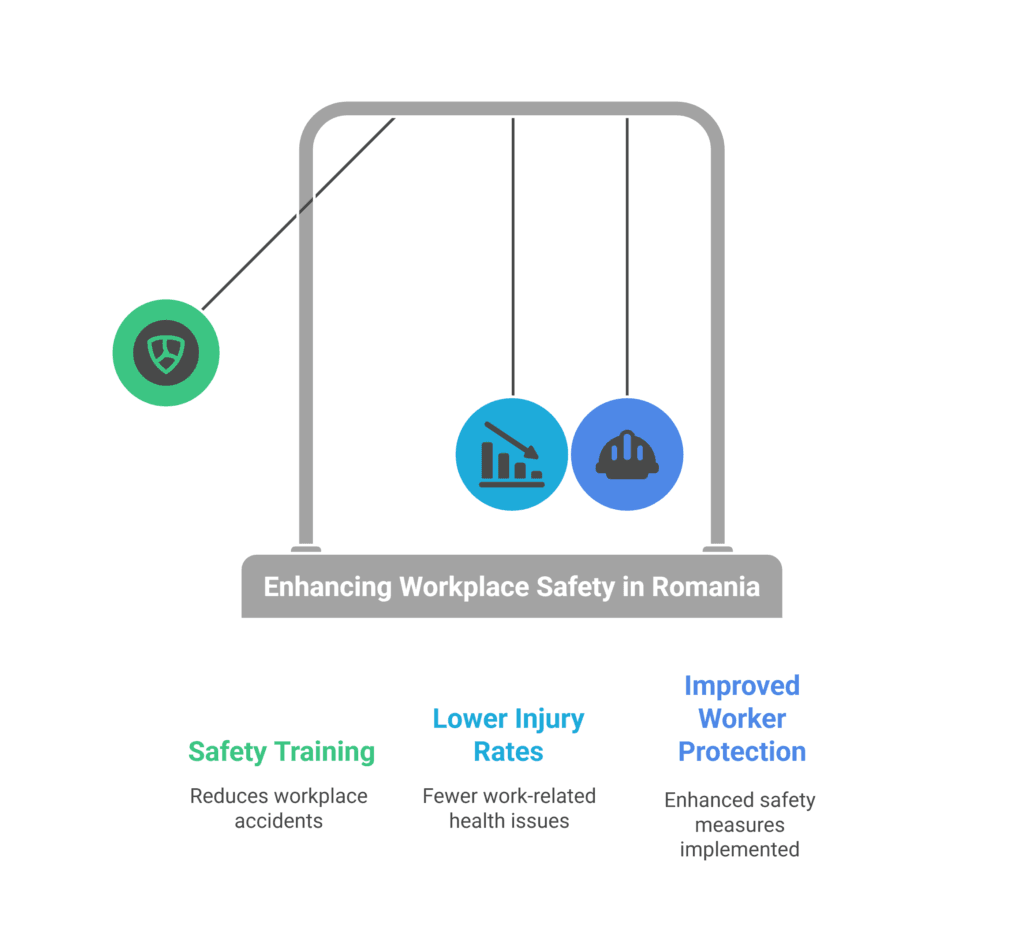
Workplace safety is key, and Romania offers insights into job site inspections and preventing accidents.
This knowledge helps employers and employees make workplaces safer.
In 2020, Romania had some of the lowest rates of work-related health problems in the EU.
Only 3.0% of workers faced such issues.
This shows the value of safety training and accident reporting in Romania.
Industry-Specific Accident Rates
Workplace risks vary by industry.
Recent data shows:
- Agriculture and forestry: 15.8% work-related health problems;
- Construction: 76.3% exposure to physical risk factors;
- Manufacturing: High incidents of musculoskeletal disorders.
Most Common Causes of Workplace Injuries
Claims for worker compensation in Romania highlight key injury causes:
- Musculoskeletal disorders (6.0% of workers affected);
- Physical risk factor exposure;
- Psychological stress and work pressure.
Annual Trends and Analysis
Romania’s workplace safety is improving.
By 2035, it aims to cut down fatal accidents significantly.
This shows a strong commitment to protecting workers and preventing incidents.
| Workplace Safety Metric | Romania’s Status |
|---|---|
| Work-Related Health Problems | 3.0% (Lowest in EU) |
| Fatal Accident Projection | Expected to end by 2035 |
| Expected Workplace Deaths (2021-2029) | 1,136 |
These statistics highlight the need for better workplace safety strategies and ongoing protection of workers.
Employee Rights After a Workplace Accident
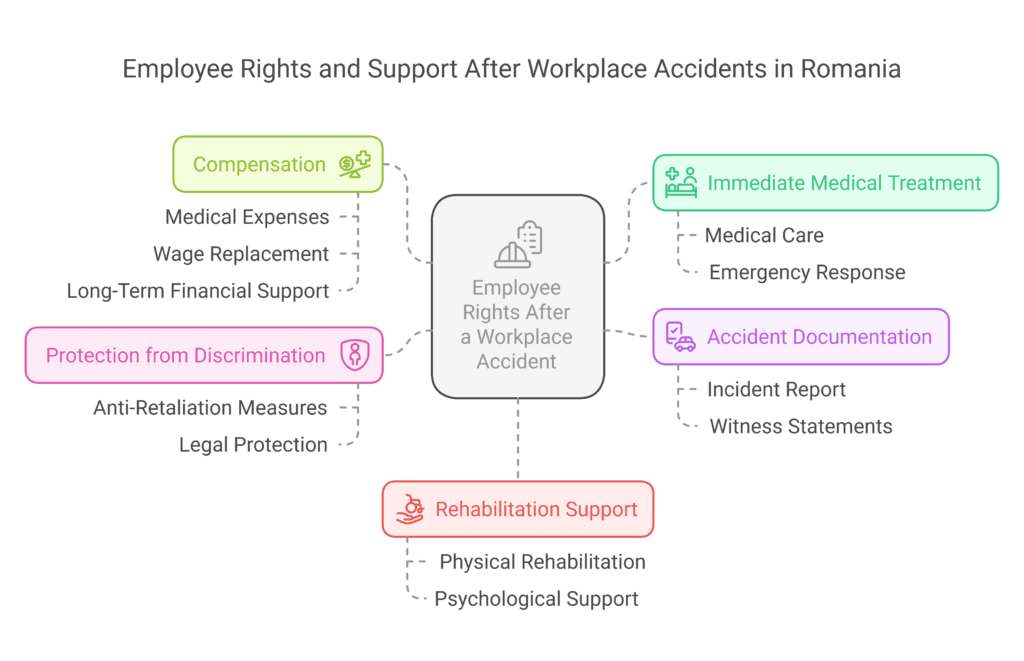
When a workplace accident happens in Romania, knowing your rights is key.
It helps protect your health and job future.
Employers must support and protect you after an accident.
Your main rights after an accident include:
- Immediate medical treatment and care;
- Full documentation of the accident;
- Compensation for injuries;
- Protection from workplace discrimination;
- Potential rehabilitation support.
Occupational safety Romania laws let you report incidents in many ways.
You can tell your boss, contact the Labor Inspectorate, or get a lawyer if needed.
The workplace risk management Romania system offers support for injured workers.
Here’s what you can expect:
| Accident Type | Compensation Coverage | Legal Timeframe |
|---|---|---|
| Minor Injury | Medical Expenses | Immediate – 30 Days |
| Temporary Disability | Wage Replacement | Up to 180 Days |
| Permanent Disability | Long-Term Financial Support | Ongoing Assessment |
Guidelines for preventing industrial accidents in Romania stress your right to refuse unsafe work.
They also protect you from being punished for reporting safety issues.
Legal Procedures for Filing Workplace Accident Claims
Dealing with workplace hazards in Romania can be tough.
But knowing how to file accident claims is key to protecting your rights.
If you get hurt at work, knowing the right steps can help a lot with your compensation and recovery.
Romania’s labor laws give clear rules for workers to seek justice after an accident.
The process has important steps that need careful attention and documentation.
Required Documentation for Your Claim
To file a workplace accident claim, you’ll need some key documents:
- Detailed medical reports of your injury;
- Incident reports from your employer;
- Statements from coworkers who saw the accident;
- Records of employee safety training in Romania;
- Photos of the accident site and your injuries.
Timeline for Legal Actions
Knowing the timeline is key for construction site accidents in Romania.
You should:
- Tell your employer about the accident right away;
- File a claim with the Labor Inspectorate within 30 days;
- Start legal action within 2 years of the accident;
- Gather all needed safety regulations documents.
Role of Legal Representatives
Legal experts are very important in workplace accident claims.
They can:
- Help understand complex legal papers;
- Talk to insurance companies for you;
- Speak for you in court;
- Make sure you get fair compensation.
Remember, every workplace accident is different. Getting professional legal help can greatly improve your chances of a successful claim.
Employer Liability in Workplace Accidents
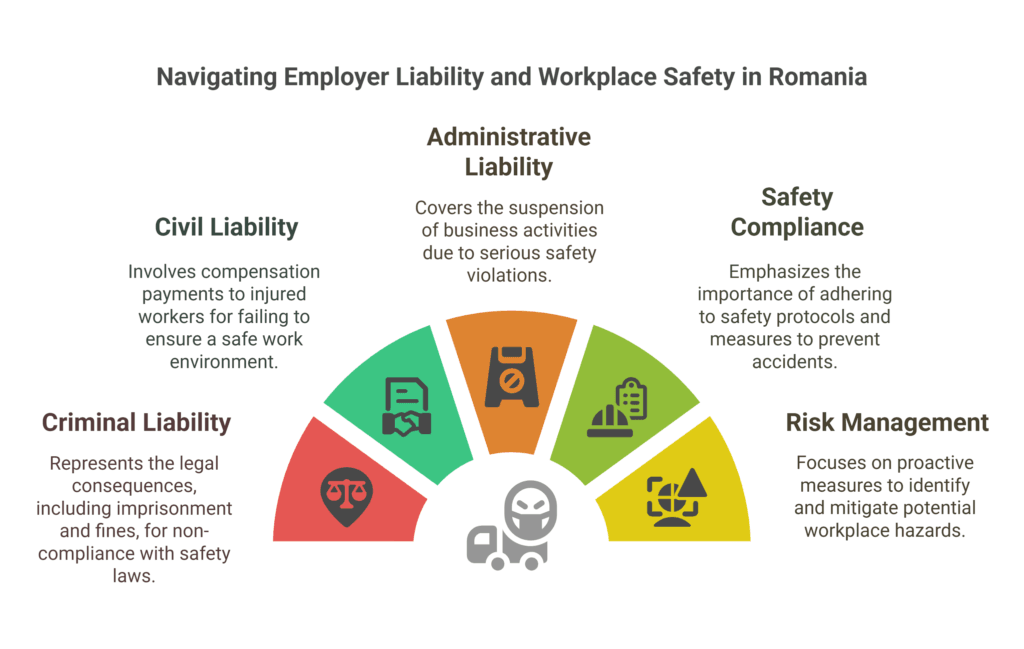
It’s important to know about employer liability in Romania.
The laws make employers responsible for keeping workers safe.
They must prevent injuries and handle hazards.
Romanian law sets rules for employers in industrial accidents.
Law no. 319/2006 says employers must keep their workers safe.
This is true even if they hire outside safety services.
Key Aspects of Employer Liability
- Criminal liability can be applied to both legal entities and individual managers;
- Penalties range from LEI 12,000 to LEI 1,200,000 for non-compliance;
- Potential imprisonment from six months to three years for serious violations.
The Romanian Criminal Code has two main offenses for employee protection:
- Failure to implement mandatory health and safety measures;
- Failure to observe established safety protocols.
Employers need to act to lower their risks in workplace safety.
They should:
- Give clear safety instructions;
- Choose people to watch over safety;
- Check for risks often.
| Liability Type | Potential Consequences |
|---|---|
| Criminal Liability | Imprisonment, fines |
| Civil Liability | Compensation to injured workers |
| Administrative Liability | Business activity suspension |
Employers can be blamed even if no accident happens.
The causal link between their actions and risks is important.
It helps decide if they are legally at fault.
Prevention Strategies and Risk Management
Job site risks in Romania need a proactive approach to safety.
The European Union has a strong legal framework for workplace safety.
This framework requires employers to manage risks well.
By doing so, your organization can lower workplace accidents.
Risk assessments are key to spotting hazards early.
Romanian law demands detailed checks of work conditions.
These checks cover physical and mental risks.
They help prevent worker compensation claims by tackling dangers early.
Best Practices for Safety Compliance
Effective safety starts with training and awareness.
Regular safety checks, teaching employees, and detailed accident reports in Romania can cut down on incidents.
It’s important to build a safety culture.
This culture lets workers speak up about risks before they get worse.
Risk Assessment Protocols
Need help with workplace safety? Contact an Employment Lawyer in Bucharest at office@theromanianlawyers.com.
They offer advice on Romania’s safety laws.
We can help create strategies that protect everyone in the workplace.
FAQ
What are the most common types of workplace accidents in Romania?
In Romania, falls from heights and injuries from machinery are common.
Construction site accidents, transportation incidents, and accidents with heavy equipment also happen often.
Construction, manufacturing, and transportation have the most incidents.
What should I do immediately after a workplace accident in Romania?
First, get medical help right away.
Tell your employer about the accident within 24 hours.
Take photos and get witness statements.
Keep all medical records.
Also, tell the local labor inspectorate and save evidence for compensation claims.
Am I entitled to compensation if I’m injured at work?
Yes, Romanian labor laws say you can get compensation for work injuries.
This includes medical costs, disability benefits, and costs for rehabilitation.
You might also get damages for pain and suffering.
The amount of compensation depends on the injury’s severity and how it affects your work.
What safety equipment must employers provide in Romania?
Employers must give you the right PPE for your job.
This includes helmets, protective clothes, gloves, safety glasses, and more.
The equipment must meet Romanian safety standards and be kept in good condition.
How long do I have to file a workplace accident claim?
In Romania, you have 2 years to file a claim after the accident or when you knew about the injury.
It’s important to report the accident to your employer quickly and get medical help soon to support your claim.
What are my rights if my employer doesn’t provide a safe working environment?
You can refuse unsafe work, ask for a safety check, and report unsafe conditions to the labor inspectorate.
If your employer doesn’t keep the workplace safe, you might get compensation and can take legal action.
Do temporary workers have the same workplace safety protections?
Yes, temporary and contract workers have the same safety protections as permanent employees in Romania.
Employers must give them the same safety training, equipment, and measures.
How are workplace accidents reported in Romania?
Accidents must be told to the employer right away and documented in an official report.
You also need to notify the local labor inspectorate.
The report should have all the details of the incident, witnesses, and medical treatment.
What types of industries have the highest workplace accident rates?
Construction, manufacturing, transportation, agriculture, and mining have the most accidents in Romania.
These jobs involve a lot of physical work and dangerous conditions, so they need extra safety steps.
Can I be fired for reporting a workplace safety concern?
No, Romanian laws protect you from being fired for reporting safety issues.
If you’re fired or treated unfairly for raising safety concerns, you can file a complaint and might get legal help.





